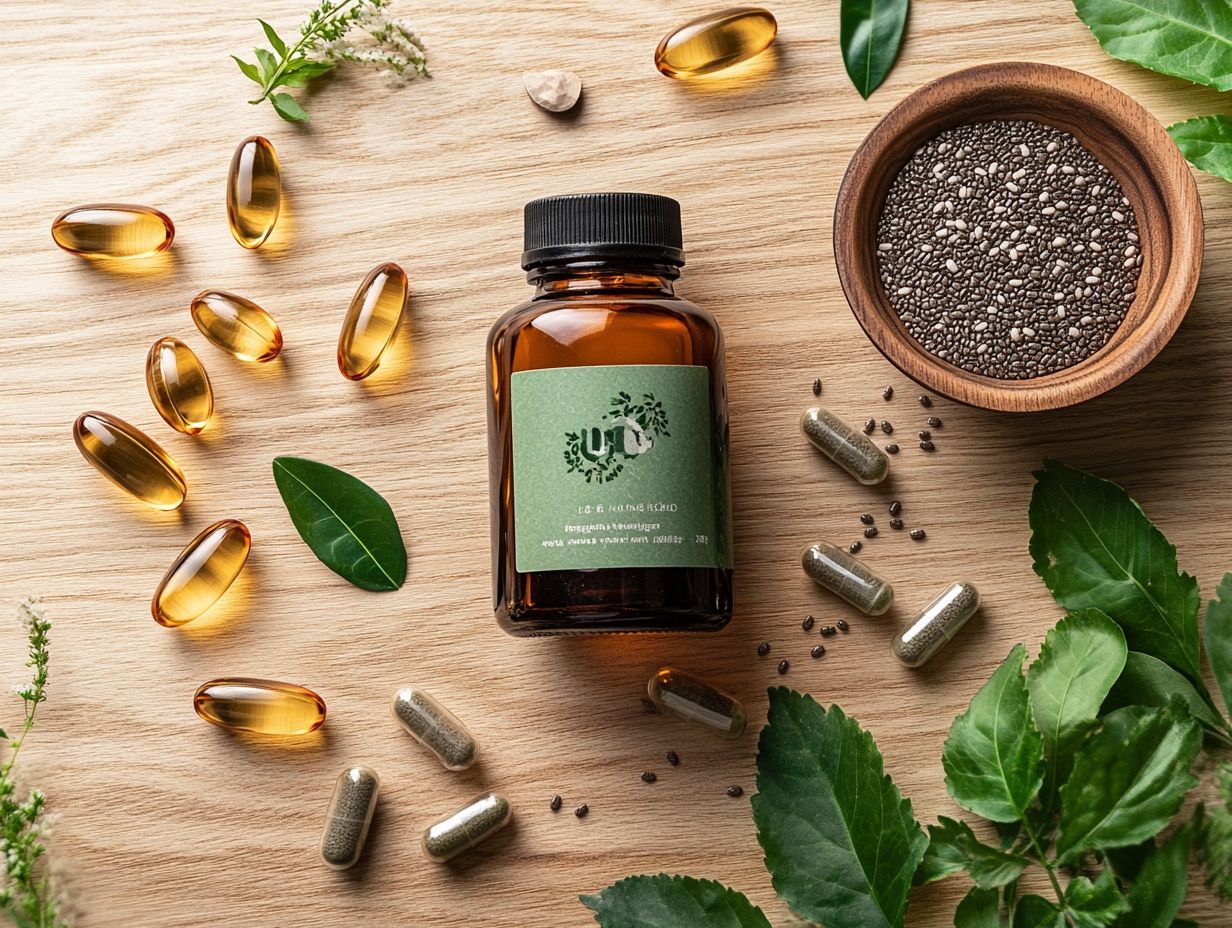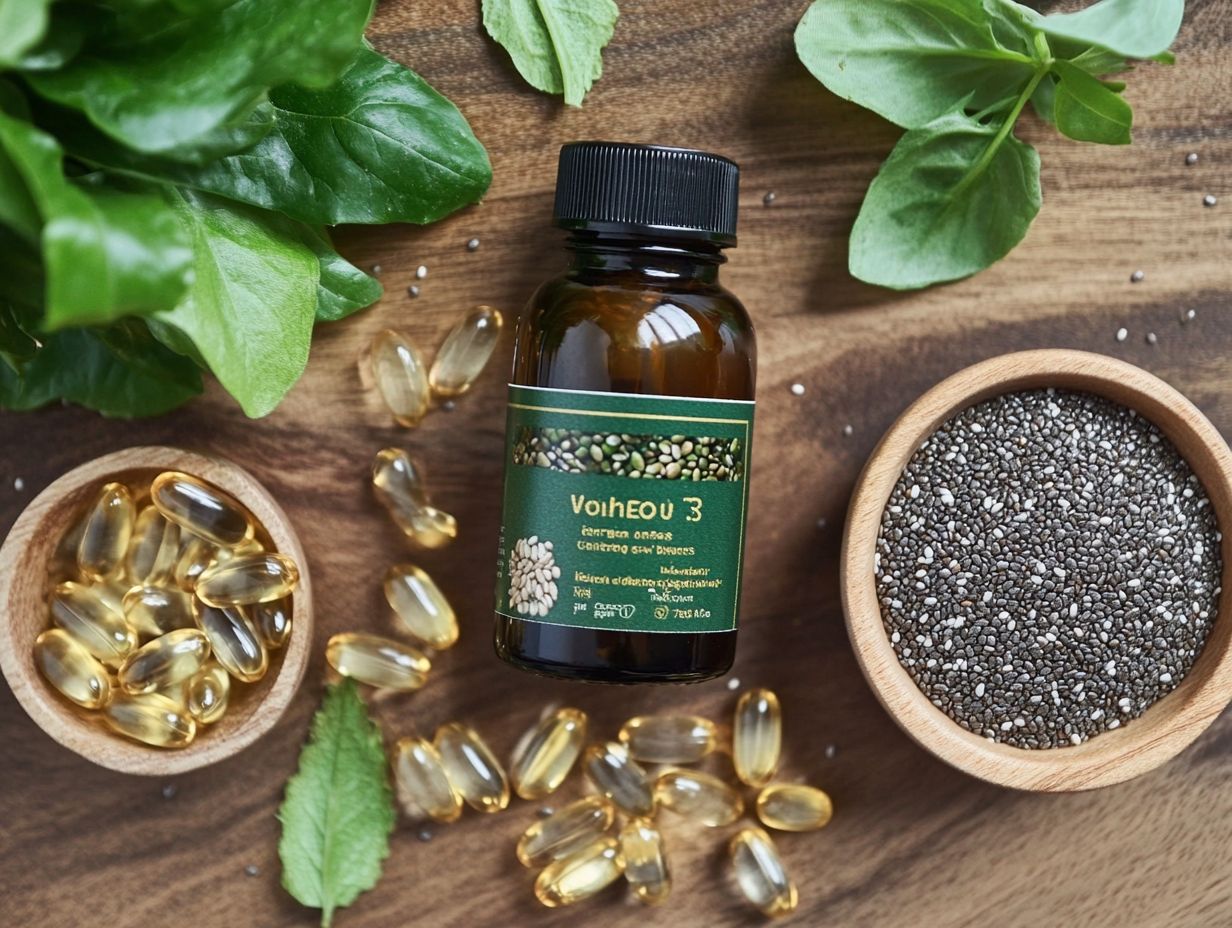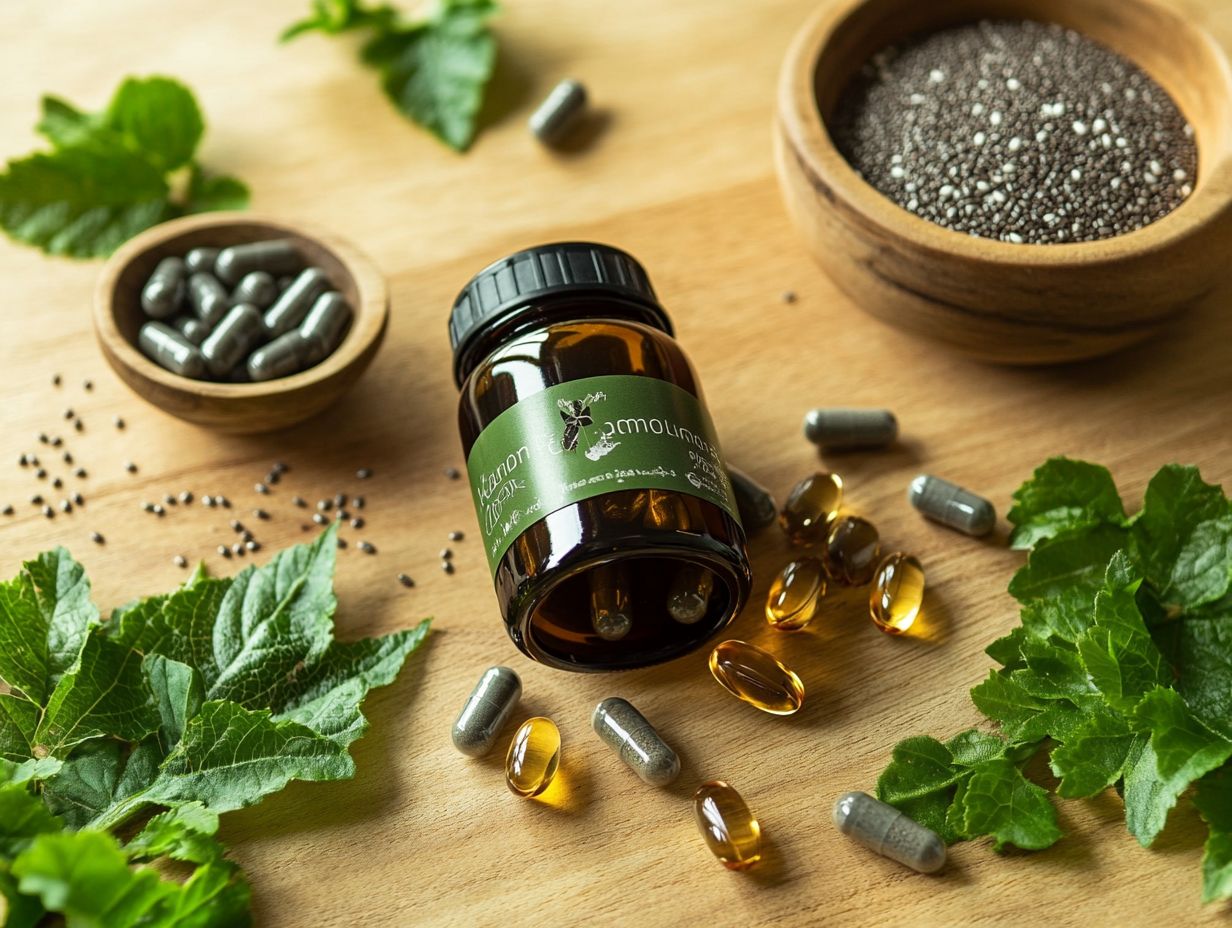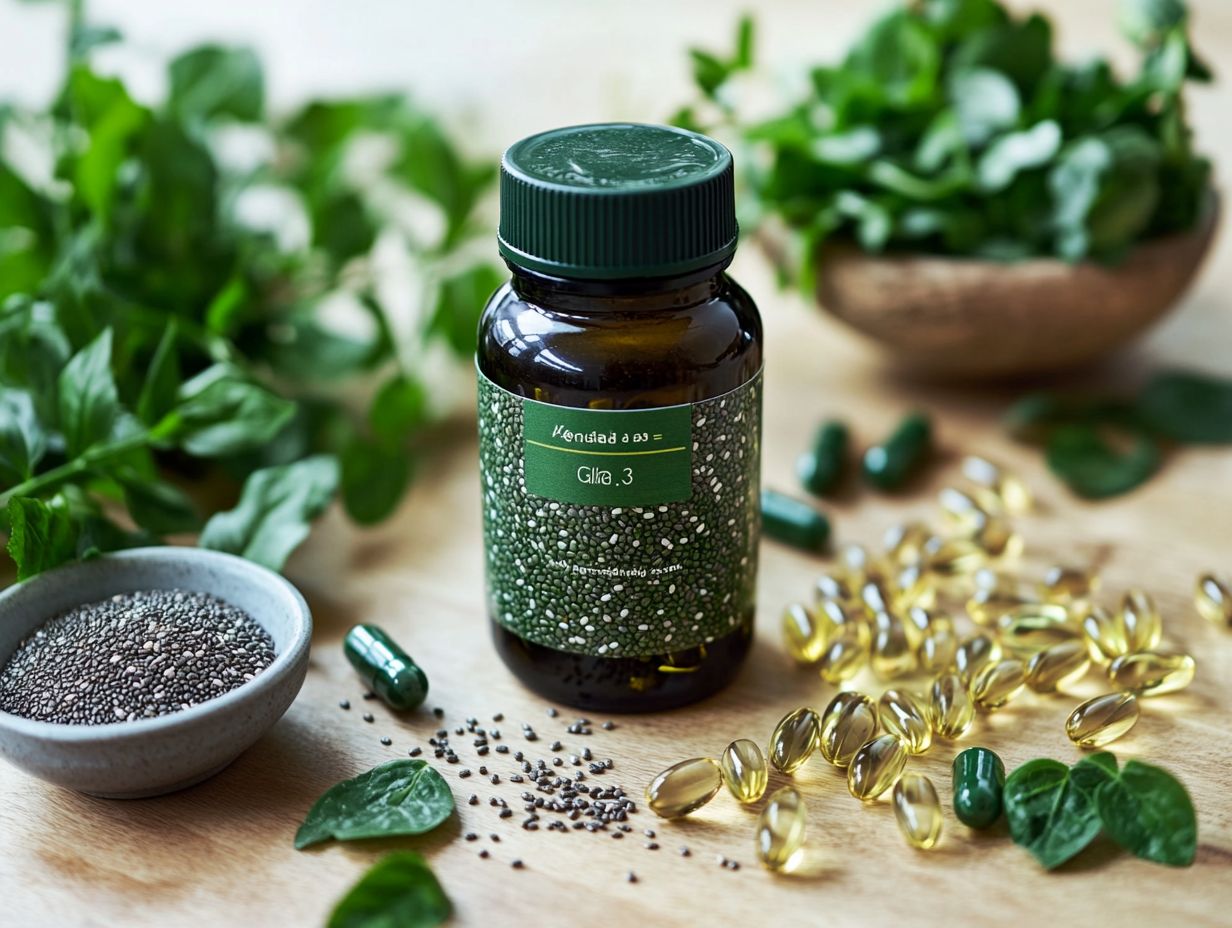Omega-3 fatty acids are vital for maintaining good health, yet suitable sources can be limited for vegans. Sustainable vegan omega sources provide an eco-friendly alternative for those seeking a plant-based diet. This information highlights the significance of omega-3s as a crucial nutrient for individuals following a plant-based diet, identifies the best vegan sources of omega-3, and outlines the potential risks associated with certain supplements, such as carrageenan and environmental contaminants. Additionally, it offers guidance on selecting the right omega-3 supplements, including carrageenan-free capsules, and reviews their numerous health benefits, such as heart health support and cognitive function improvement.
Key Takeaways:
- Vegan omega-3 supplements, including those from brands like Future Kind and Ritual, are essential for vegans as they provide important health benefits such as supporting heart health, improving brain function, and reducing inflammation.
- Carrageenan, a controversial ingredient found in many omega-3 supplements, should be avoided by vegans due to its potential negative effects on health.
- When choosing a vegan omega-3 supplement without carrageenan, it is important to check the ingredients list, look for third-party certifications, and read reviews to ensure its quality and safety.
Why Is Omega-3 Important for Vegans?
 Omega-3 fatty acids are essential for everyone, including vegans, as they contribute to optimal health, particularly when sourced sustainably from algae-based vegan sources. For vegans, the importance of omega-3 fatty acids is heightened because they do not consume fish, which is a primary source of these nutrients for most people. Algae-based vegan omega-3 supplements serve as the best alternative, providing similar benefits as traditional omega-3 supplements without harming the environment. Plant-based omega-3 supplements can support overall health, including promoting heart health and enhancing cognitive function.
Omega-3 fatty acids are essential for everyone, including vegans, as they contribute to optimal health, particularly when sourced sustainably from algae-based vegan sources. For vegans, the importance of omega-3 fatty acids is heightened because they do not consume fish, which is a primary source of these nutrients for most people. Algae-based vegan omega-3 supplements serve as the best alternative, providing similar benefits as traditional omega-3 supplements without harming the environment. Plant-based omega-3 supplements can support overall health, including promoting heart health and enhancing cognitive function.
What Are the Best Sources of Omega-3 for Vegans, including those with a focus on premium quality raw ingredients?
The best vegan sources of omega-3 fatty acids are essential for those following a vegan diet to reap the numerous health benefits associated with these fatty acids. While fish oil is often regarded as the top source of omega-3s, there are many plant-based alternatives that can meet the body’s full requirements. Sustainable vegan sources such as:
- Flaxseed oil
- Chia seeds
- Algae oil supplements
offer excellent options. These alternatives provide a rich supply of DHA and EPA and are free from environmental contaminants and heavy metal analysis to ensure safety.
1. Plant-based Sources
Plant-based sources of omega-3 fatty acids are abundant and serve as essential building blocks for vegans to meet their dietary needs. Flaxseed oil is particularly renowned for its high content of alpha-linolenic acid (ALA), while chia seeds and hemp seeds are also excellent sources of omega-3. Additionally, walnuts are a great source of plant-based omega-3 and contribute to overall heart health. Incorporating these omega-3-rich foods into a vegan diet is crucial for ensuring a balanced intake of essential fatty acids, while also providing additional nutrients unique to each food. Chia seeds, being high in fiber and protein, make a fantastic addition to smoothies or oatmeal. Hemp seeds are rich in magnesium and vitamin E, and they add a pleasant nutty flavor when sprinkled on salads or blended into energy bars. Walnuts not only support cognitive function but are also packed with antioxidants that enhance the benefits of omega-3. By incorporating these diverse sources into daily meals whether in blended smoothies, hearty salads, or nutritious snacks it’s easy to boost omega-3 intake, thereby supporting heart health and improving brain function. This aligns with health wellness claims often touted by brands such as The Veggie Doctor and Zenwise.
2. Algae Oil Supplements
Algae oil supplements are among the most popular vegan sources of omega-3 fatty acids, providing DHA and EPA in a manner similar to non-vegan fish oil supplements. These algae-based supplements are an excellent choice for meeting omega-3 needs without the adverse effects associated with overfishing, making them a more sustainable and environmentally friendly option. The omega-3 supplements derived from algae feature premium quality raw materials and come in carrageenan-free capsules, ensuring they do not contain this additive. These supplements are often available with free shipping orders and a risk-free trial to encourage customer reviews site engagement. The extraction of algae oil involves cultivating specific strains of microalgae in controlled environments to maximize nutrient uptake. This process results in high levels of DHA and EPA while ensuring product purity, as these supplements typically lack the contaminants found in marine sources. Algae oil offers several benefits, including a preferable EPA to DHA ratio compared to other omega-3 sources, which is crucial for maintaining heart and cognitive health. To fully reap the benefits of omega-3 fatty acids, it is important to choose high-quality, certified algae oil supplements to ensure potency and efficacy.
What Is Carrageenan and Why Is It Controversial?
Carrageenan is a thickening agent derived from red algae that is widely used in various food products; however, it has sparked considerable debate regarding its safety and health effects. Commonly utilized in a variety of vegan products for its gelling properties, carrageenan has been linked in some research to gastrointestinal issues and inflammation. These findings have prompted health and wellness advocates to raise concerns about its safety for consumption. As a result, there has been a significant consumer demand for carrageenan-free capsules, particularly in omega-3 supplements, as people seek to avoid any potential negative health effects. Brands like Amandean and OmegaVia have responded to this trend by offering vegan gelatin softgel options.
Why Should Vegans Avoid Carrageenan in Omega-3 Supplements?
Vegans should avoid carrageenan in omega-3 supplements due to the growing evidence linking it to inflammation and digestive issues. Since omega-3 supplements are often used to support heart health and improve cognitive function, it is essential to choose high-quality products that do not contain fillers or binders that may diminish their benefits. The risks associated with carrageenan, particularly from environmental contaminants, can compromise the overall efficacy of omega-3 supplements in delivering their intended health benefits. Therefore, choosing supplements with no fillers or binders is crucial. Consequently, many individuals are seeking safer alternatives that align more closely with health and wellness claims.
What Are the Alternatives to Carrageenan in Omega-3 Supplements?
 Carrageenan-free omega-3 supplements are available as alternatives for consumers who prefer to avoid carrageenan in their dietary choices. These capsules are now widely accessible and are made from sustainable vegan omega sources, offering the benefits and quality associated with high-grade nutritional supplements. Omega-3 supplements that do not contain fillers or binders promote optimal absorption and effectiveness for consumers, while also adhering to health and wellness claims, as supported by testimonials featured in publications like Sports Illustrated and The Beet.
Carrageenan-free omega-3 supplements are available as alternatives for consumers who prefer to avoid carrageenan in their dietary choices. These capsules are now widely accessible and are made from sustainable vegan omega sources, offering the benefits and quality associated with high-grade nutritional supplements. Omega-3 supplements that do not contain fillers or binders promote optimal absorption and effectiveness for consumers, while also adhering to health and wellness claims, as supported by testimonials featured in publications like Sports Illustrated and The Beet.
1. Flaxseed Oil
Flaxseed oil is one of the richest sources of alpha-linolenic acid (ALA), a type of omega-3 fatty acid that offers numerous health benefits, making it an essential addition to a vegan diet. This plant-based oil has gained attention for its potential to support heart health and improve cognitive function while being easily incorporated into smoothies, salads, and baked goods. Rich in omega-3 benefits, flaxseed oil is vital for vegans seeking to enhance their overall wellness. Its nutritional profile is further enriched with lignans and various antioxidants, making it a powerhouse for maintaining a healthy body. To enjoy its benefits, one can:
- Drizzle flaxseed oil on roasted vegetables
- Use it as a dressing for salads
- Mix it into morning smoothies
Studies have revealed that the ALA in flaxseed oil can significantly reduce inflammation, support heart health, and even contribute to improved brain function. For instance, a study published in the American Journal of Clinical Nutrition noted improvements in cardiovascular markers among participants who regularly included flaxseed oil in their diets. Testimonials from health enthusiasts highlight a boost in energy levels and a notable enhancement in skin health, showcasing the holistic benefits this oil provides.
2. Chia Seeds
Chia seeds are a nutritious source of omega-3 fatty acids, providing a plant-based option that can enhance the nutritional value of a variety of dishes. These small seeds expand in size when soaked in liquid, making them ideal for incorporation into smoothies, puddings, or as a topping for yogurt. They are among the best sources of omega-3 for vegans and vegetarians who do not consume fish, ensuring there is no negative impact on marine ecosystems. Plus their omega-3 content, chia seeds are rich in dietary fiber, offering over 10 grams per ounce, which can aid in maintaining healthy digestion and promoting a feeling of fullness. Furthermore, they are excellent sources of essential nutrients, including protein, calcium, magnesium, and antioxidants. Chia seeds can be easily added to meals by stirring them into oatmeal, sprinkling them on salads, or using them as a thickening agent in soups and sauces. Their ability to absorb water and develop a gel-like consistency enhances recipes while providing a range of health benefits.
3. Hemp Seeds
Hemp seeds are a nutrient-rich source of omega-3 and omega-6 fatty acids in a balanced ratio, making them an excellent addition to a vegan diet. Just a few tablespoons provide a substantial amount of high-quality protein comparable to that found in animal or dairy sources, and they are also rich in magnesium, phosphorus, and iron. Incorporating hemp seeds into pancake mixes, oatmeal, or using them as a yogurt topping can enhance meal variety. The omega-3 fatty acids in hemp seeds support heart health, brain function, and skin health, making them a great all-in-one option for anyone following a healthy plant-based diet.
4. Walnuts
Walnuts are a nutritious food known for their unique flavor and impressive nutritional profile, making them the most recognized plant-based source of omega-3 fatty acids. Tasty and versatile, walnuts can be enjoyed in salads, added to baked goods, or eaten as a snack on their own. They are often used in vegan diets as a complementary omega-3 supplement. The omega-3 benefits of walnuts include promoting heart health support, enhancing brain function, and improving cognitive function by reducing inflammation in the body. Their rich antioxidant content contributes to their numerous health benefits and makes them a valuable food supplement for adults. Additionally, walnuts are a good source of essential minerals such as magnesium and phosphorus, along with vitamin E. They provide essential amino acids, making them an excellent complement to a plant-based diet. Their consumption has no negative impact on the environment, which is an added benefit for environmentally conscious consumers. Incorporating walnuts into meals is both easy and delicious; for example, chopped walnuts can enhance Greek yogurt by adding texture, provide creaminess to smoothies, or add flavor and healthy fats to roasted vegetables. Their versatility allows even the health-conscious to easily include these nuts in a variety of dishes. They are often available without fillers or binders, ensuring a premium quality raw ingredient.
5. Algae Oil
Algae oil is an innovative and promising algae-based vegan source of omega-3 fatty acids, particularly for vegans seeking to obtain DHA and EPA without relying on fish products. This plant-based oil is extracted from algae, making it a sustainable option that is free from many environmental contaminants, positioning it as one of the healthiest and most environmentally friendly supplement choices available. The extraction process involves culturing specific strains of algae, followed by harvesting and processing them to isolate the beneficial oils. When compared to traditional sources, algae oil presents a plant-based, eco-friendly, and nutritionally rich alternative. Many consumers opt for algae oil capsules, including carrageenan-free capsules, as a convenient method to incorporate these beneficial fats into their diets. Research has demonstrated that regular consumption of algae oil can support healthy heart function by lowering triglyceride levels and improving cholesterol. It also plays a significant role in maintaining cognitive health, may aid in memory and mood stabilization, and provide joint mobility improvement through its balanced EPA DHA ratio. Moreover, algae oil can be given to dogs as a source of omega-3 fatty acids, particularly for those with allergies or sensitivities to fish products. Additionally, when applied topically, algae oil provides moisture and hydration to the skin, enhancing its overall health. It can also be found in vegan gelatin softgel form for easy consumption.
6. Fish Oil (for non-vegans)
 For non-vegans, fish oil is by far the most common source of omega-3 fatty acids, particularly EPA and DHA, which offer numerous omega 3 benefits. The widespread availability of fish oil supplements has led consumers to regard them as some of the most effective ways to promote heart health and cognitive function. However, the shift towards plant-based alternatives has prompted many individuals to explore sustainable omega-3 sources that deliver similar benefits without the potential drawbacks associated with fish oil, such as heavy metal contamination. Brands like Calgee and life sOMEGA offer such alternatives. While fish oil consumption does have its risks, the most notable being potential contamination with heavy metals like mercury, which can adversely affect health if consumed in excess, the environmental impact of fishing and aquaculture practices raises concerns about the sustainability of fish oil as a supplement, especially when compared to algae-based vegan options. Brands that implement responsible sourcing practices and subject their products to rigorous and ongoing heavy metal analysis can alleviate some of these concerns, empowering consumers to make more informed choices regarding omega 3 supplements. In contrast, vegan omega-3 sources like algae oil present an appealing alternative that mitigates many of the environmental and health-related issues while still providing individuals with the essential fatty acids they need. Popular brands such as The Beet and Future Kind offer such products. It is crucial for anyone considering omega-3 supplementation to consider the ecological footprint and quality of the product they choose. Checking if the product offers free shipping orders and a risk-free trial can also be beneficial.
For non-vegans, fish oil is by far the most common source of omega-3 fatty acids, particularly EPA and DHA, which offer numerous omega 3 benefits. The widespread availability of fish oil supplements has led consumers to regard them as some of the most effective ways to promote heart health and cognitive function. However, the shift towards plant-based alternatives has prompted many individuals to explore sustainable omega-3 sources that deliver similar benefits without the potential drawbacks associated with fish oil, such as heavy metal contamination. Brands like Calgee and life sOMEGA offer such alternatives. While fish oil consumption does have its risks, the most notable being potential contamination with heavy metals like mercury, which can adversely affect health if consumed in excess, the environmental impact of fishing and aquaculture practices raises concerns about the sustainability of fish oil as a supplement, especially when compared to algae-based vegan options. Brands that implement responsible sourcing practices and subject their products to rigorous and ongoing heavy metal analysis can alleviate some of these concerns, empowering consumers to make more informed choices regarding omega 3 supplements. In contrast, vegan omega-3 sources like algae oil present an appealing alternative that mitigates many of the environmental and health-related issues while still providing individuals with the essential fatty acids they need. Popular brands such as The Beet and Future Kind offer such products. It is crucial for anyone considering omega-3 supplementation to consider the ecological footprint and quality of the product they choose. Checking if the product offers free shipping orders and a risk-free trial can also be beneficial.
How to Choose the Best Vegan Omega-3 Supplement Without Carrageenan?
The best vegan omega-3 supplement is one that is crafted with careful attention to various factors to ensure optimal health benefits while maintaining safety. One of the most crucial considerations is the absence of carrageenan in capsules, as this ingredient has raised concerns regarding its safety and efficacy. Choosing a product with no fillers binders is advisable. Another important factor is the conduct of heavy metal analysis on the supplements, as this is the only way to guarantee they are free from environmental contaminants, making them essential for adult consumers seeking to support their diverse health needs. Health wellness claims should be backed by rigorous testing and certifications. Many brands offer a risk-free trial for at least 30 days, allowing consumers to test the product without any financial commitment. Companies like Ritual, Amandean, OmegaVia, and Vegan Vitality are known for such offers.
1. Check the Ingredients List
When selecting a vegan omega-3 supplement, checking the ingredients list is an essential step, as it provides valuable insight into the product’s quality and safety. Premium quality raw ingredients are often highlighted in reputable products. This practice helps identify any unwanted additives that could compromise the overall effectiveness of the supplement. It’s crucial to ensure there are no fillers binders that could dilute the product’s potency. Consumers should be cautious of artificial colors and preservatives, which may cause allergic reactions or other health issues. It is advisable to avoid supplements containing potentially harmful substances like heavy metals, often found in lower-quality fish oil alternatives. Trustworthy brands like Zenwise and Freshfield offer transparency regarding their ingredients. When searching for reliable brands, companies such as NutraBlast and Testa prioritize transparency by offering clearly sourced ingredients and third-party testing to assure customers of their commitment to quality and health. Other notable brands include GINSPIRE NUTRITION and The Veggie Doctor. By choosing products from these reputable sources, individuals can support their well-being with confidence while adhering to a vegan lifestyle, ensuring they meet their omega 3 requirements effectively.
2. Look for Third-Party Certifications
Omega-3 supplements that have been certified as safe and effective by independent third parties offer greater assurance to consumers. These assessments typically include thorough testing for heavy metals and other contaminants, ensuring that the supplement is free from harmful toxins and that it meets its advertised health claims and other health wellness claims. Certifications from reputable organizations enhance the product’s credibility and help consumers make informed decisions. Some of the most recognized and respected organizations that provide these assessments include independent certifiers that verify the absence of environmental contaminants:
- NSF International
- ConsumerLab
- The United States Pharmacopeia (USP)
These certifications add transparency to the often confusing supplements market, enabling consumers to select products that are both safe and effective. For those seeking a vegan omega-3 supplement, choosing one that has been certified signifies a higher level of quality and safety, allowing users to take the supplement with confidence. Checking customer reviews site feedback can also provide additional reassurance.
3. Read Reviews and Do Research
When selecting a vegan omega-3 supplement, reading customer reviews and conducting thorough research are essential steps, as they provide real-world insights into the product’s effectiveness and reliability. Sites like Sports Illustrated and The Beet often review such supplements. Customers frequently share their opinions about health claims and the benefits they have experienced, which assists prospective buyers in assessing the product’s credibility. Dedicated customer reviews site platforms can help ensure that the chosen supplement aligns with one’s health goals. This process extends beyond merely reading reviews; exploring expert opinions and findings from research studies can deepen understanding of the benefits of omega-3 and the various source options available. Many people also find it helpful to incorporate community input, as discussions in health-oriented forums often share personal stories and advice that may not be covered in academic studies. By considering a variety of resources, potential purchasers can gather valuable information that will aid them in making decisions that are suitable not only for their dietary needs but also for their overall health goals and lifestyle preferences. Experts like Prateek and Shreya from The Veggie Doctor often provide insights into the best choices in the market.
What Are the Benefits of Taking Vegan Omega-3 Supplements?
Vegan omega-3 supplements offer numerous benefits for overall health and wellness, particularly for individuals who need supplementation to meet their daily omega-3 requirements. They provide a plant-based source of essential fatty acids. Here are some of the primary advantages of taking vegan omega-3 supplements:
- Support for Heart Health: Omega-3 fatty acids have been linked to improved cardiovascular health. These supplements can help lower blood cholesterol and triglyceride levels, reduce blood pressure, and decrease the risk of blood clot formation.
- Enhancement of Cognitive Function: Omega-3 fatty acids, particularly EPA and DHA, are essential for brain health. Research has shown that they can improve cognitive function and memory in both healthy individuals and those experiencing cognitive decline.
- Improvement of Joint Mobility: Omega-3 fatty acids, especially EPA and DHA, have been found to enhance joint mobility and reduce stiffness. Additionally, they can decrease the production of inflammatory molecules, which may help alleviate symptoms of rheumatoid arthritis and other inflammatory joint diseases.
1. Supports Heart Health
 Vegan omega-3 supplements are popular dietary additions due to their well-documented benefits for heart health. Research indicates that omega-3 fatty acids can lower triglyceride levels and blood pressure while also improving overall cardiovascular function. This underscores the importance of these supplements in helping individuals achieve optimal heart health alongside a vegan diet. For instance, a study published in the Journal of the American College of Cardiology found that omega-3s enhance endothelial function, which is a vital aspect of vascular health. Regular consumption of plant-based omega-3 sources, such as algae oil and flaxseed oil, is associated with improved heart health support and can easily be incorporated into the diet through oils added to smoothies, salad dressings, or baked goods. Algae-based vegan supplements offer an excellent omega-3 alternative.
Vegan omega-3 supplements are popular dietary additions due to their well-documented benefits for heart health. Research indicates that omega-3 fatty acids can lower triglyceride levels and blood pressure while also improving overall cardiovascular function. This underscores the importance of these supplements in helping individuals achieve optimal heart health alongside a vegan diet. For instance, a study published in the Journal of the American College of Cardiology found that omega-3s enhance endothelial function, which is a vital aspect of vascular health. Regular consumption of plant-based omega-3 sources, such as algae oil and flaxseed oil, is associated with improved heart health support and can easily be incorporated into the diet through oils added to smoothies, salad dressings, or baked goods. Algae-based vegan supplements offer an excellent omega-3 alternative.
2. Improves Brain Function
One of the most significant advantages of vegan omega-3 supplements, including algae-based vegan options like Calgee and life sOMEGA, is their ability to improve cognitive function, which is essential for mental clarity and overall brain health. Both DHA and EPA, found in these supplements, are critical for brain development, functioning, and neuroprotection, making them particularly beneficial for individuals at risk of cognitive decline. With adequate omega-3 intake, vegans can effectively support their brain health and enhance their cognitive abilities. Research has shown that DHA and EPA are essential for reducing inflammation and oxidative stress, both of which are major contributors to neurodegenerative conditions such as Alzheimer’s and Parkinson’s diseases. An article published in Frontiers in Aging Neuroscience indicated that higher levels of DHA are associated with better memory performance in older adults. Additionally, another study found that EPA may help regulate mood disorders, which is a crucial aspect of cognitive wellness. As the elderly population continues to grow, incorporating vegan omega-3 supplements into daily diets may be an effective strategy for preserving overall cognitive health and enhancing quality of life.
3. Reduces Inflammation
Vegan omega-3 supplements possess strong anti-inflammatory properties and can help reduce the severity of various inflammatory conditions. Omega-3 fatty acids are essential for synthesizing anti-inflammatory mediators, which can alleviate symptoms of arthritis, joint pain, and other inflammatory disorders. The benefits of omega-3s are most pronounced when individuals incorporate supplements into their diets to ensure they receive adequate amounts of these fatty acids. Specifically, EPA and DHA omega-3s have been shown to modulate cellular membranes and signaling pathways critical for managing inflammation. Clinical studies indicate that omega-3 fatty acids can lower inflammatory markers such as C-reactive protein (CRP) and interleukin-6 (IL-6), thus reducing chronic inflammation. For those who do not consume seafood or other sources of omega-3s, algae-derived supplements offer an excellent plant-based alternative to obtain the health benefits associated with omega-3s. Incorporating omega-3 supplements into daily routines, such as adding them to smoothies or salads, makes it convenient for individuals on restrictive diets to reap the benefits of these essential fatty acids.
4. Promotes Eye Health
The benefits of vegan omega-3 supplements for eye health are particularly notable due to the presence of DHA, an essential component for maintaining retinal health. Research has demonstrated that an adequate intake of omega-3 fatty acids can reduce the risk of age-related macular degeneration and dry eye syndrome. For vegans, high-quality omega-3 supplements are crucial for preserving optimal vision and overall eye health. DHA not only enhances visual function but also helps prevent inflammation within the eye, which may aid in the prevention of other disorders. To boost eye health, dietary sources include:
- Algae-based omega-3 foods, such as certain seaweeds and fortified products
- Colorful fruits and vegetables rich in antioxidants, like carrots, kale, and berries
Additionally, regular eye examinations and reducing screen time are important for preserving vision in today’s digital age.
What Are the Potential Side Effects of Vegan Omega-3 Supplements?
Vegan omega-3 supplements, like those reviewed on customer reviews sites such as The Beet and The Veggie Doctor, are generally safe and beneficial for most individuals; however, some people may experience potential side effects. Common side effects include gastrointestinal issues such as bloating or diarrhea, especially if the dosage is not properly adjusted. Selecting carrageenan-free capsules may help in minimizing such issues. Additionally, concerns about environmental contaminants in certain brands can lead to adverse reactions, underscoring the importance of selecting brands that adhere to rigorous testing standards. Each person’s body responds differently to supplements, and individual sensitivity to the ingredients can vary widely. For instance, some individuals may experience allergic reactions or negative interactions with medications they are currently taking. To minimize these side effects, it is advisable to start with a lower dose and gradually increase it, allowing the body time to adjust. Consulting with healthcare professionals before starting any new supplement is a crucial step, as they can help identify specific needs and ensure that the chosen vegan omega-3 supplement aligns with individual health requirements without unnecessary risks. Products such as vegan gelatin softgel options provide alternatives with no fillers binders.
How Much Omega-3 Should Vegans Take?
The ideal dosage of omega-3 for vegans is one that maximizes health benefits while preventing the risks of deficiency or excess. This optimal dosage is highly individualized, depending on personal health conditions, habits, and dietary intake. However, various health and wellness guidelines suggest that, on average, vegans should aim for a minimum of 250-500 mg of combined EPA and DHA per day. To determine the ideal dosage for any individual, consultation with a medical professional is recommended. Three major factors that influence the ideal omega-3 dosage for vegans include:
- Age: Older adults typically have higher omega-3 requirements due to an increased risk of cognitive impairment and other chronic health conditions.
- Health Status: Individuals with chronic illnesses, autoimmune disorders, and cardiovascular diseases may require more omega-3s than those who are generally healthy.
- Dietary Habits: A diet high in processed foods may necessitate greater reliance on omega-3 supplementation for some individuals. In contrast, a healthy diet rich in whole, minimally processed plant foods that contain ALA such as flaxseeds, chia seeds, hemp seeds, walnuts, and soybeans may provide sufficient ALA, which the body can convert into omega-3 fatty acids.
Assessing an individual s dietary sources and lifestyle can help guide them in finding the best balance of omega-3 fats.





